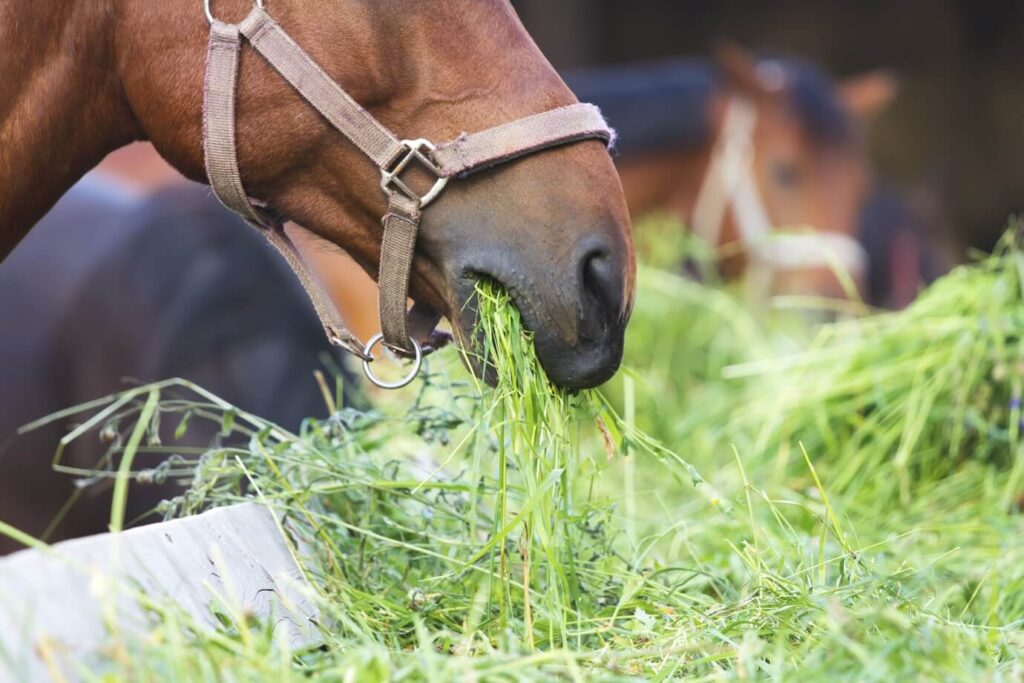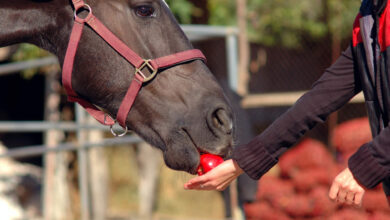
Celery is a staple vegetable in most human diets, but is it safe for horses? Many owners wonder can horses eat celery and if it makes a healthy treat.
Like any new food, celery should be fed carefully and in moderation to avoid potential risks.
Can Horses Eat Celery? Key Benefits

Celery’s crunchy texture and mild flavor make it enticing as an equine treat. Some key benefits horse owners look for include:
- High water content helps hydration
- Vitamins A, B, C and K
- Minerals like potassium, folate and manganese
- Low calorie snack option
“I give my horse Jasper a few small celeries stick after rides as a refreshing treat,” says Sarah M., a trail riding enthusiast. “He loves the crunch and it helps replace electrolytes he loses while working up a sweat.”
However, celery does come with some cautions. There are certain factors to consider before feeding celery to horses. Owners should be aware of:
- Potential pesticide residues
- Nitrate poisoning risk
- Presence of oxalates
- Mold/rot contamination
It’s key to take steps to reduce these dangers by:
- Selecting organic celery
- Confirming nitrate levels are safe
- Chopping/crushing to lessen oxalates
- Checking for damage and spoilage
Overdoing celery treats can also lead to issues like gastrointestinal upset or nutritional imbalances. That’s why moderation and portion control are vital.
So, can horses eat celery? Yes, when served properly and in limited amounts. Celery can provide some nutritional value paired with risks if not fed carefully.
Work with your vet or equine nutritionist when first introducing new foods. Monitor your horse closely for any adverse reactions.
With knowledge and caution, celery can be a safe, natural treat horses enjoy. But never forget horses are primarily grazing herbivores designed to thrive on a high-fiber, low-sugar diet. The bulk of nutrition should come from good quality hay and pasture.
Read More: Can Horses Eat Grapes?
Potential Risks of Feeding Celery to Horses
While celery can make a convenient snack, there are some potential downsides to be aware of. Celery contains compounds and risks toxicity when fed improperly or in excess.
Two naturally occurring chemicals in celery can cause toxic reactions when large amounts are consumed. Nitrates are present in all plants, but celery tends to accumulate higher levels.
If nitrate content is too high, it can cause nitrate poisoning in horses. Oxalic acid is also found in many common plants, and celery contains measurable oxalates. An excess may lead to calcium absorption problems in some cases.
Contamination is another issue. Celery plants sit low to the ground, so they are prone to gathering dirt, debris and microbes that cause rot.
Field-grown celery also runs the risk of pesticide residue if not organic. Insecticides, herbicides and fungicides should be avoided.
Interestingly, celery was once avoided as a horse feed. Some historical sources cite celery’s heating qualities and link to laminitis risk. Today it is considered safe in moderation.
How to Reduce Risks
To reduce risks, take steps like:
- Selecting certified organic celery
- Washing thoroughly before preparation
- Visually inspecting celery for mold, wilting
- Chopping/crushing to help minimize oxalates
Get celery tested for nitrate levels if sourcing from a garden. Avoid harvesting after recent high-nitrogen fertilization.
Introduce celery slowly and watch for any irritation or discomfort. Limit treats to no more than 10% of total diet. Curtail celery if loose stool, colic or other issues arise.
Work with your equine nutritionist when incorporating new foods. Follow their recommendations for optimal health and safety.
While celery can add variety, a horse’s main diet should still revolve around hay, pasture and balanced feed according to individual needs.
With prudence and moderation, celery can be a safe periodic treat. But anytime you introduce new foods, do so gradually while monitoring response. Reduce or remove celery from the diet if excess consumption leads to any adverse reaction.
Feeding Celery to Horses Safely
Celery can be a healthy treat for horses when fed properly. But what are some guidelines for safe preparation and serving? Here are important rules to follow:
- Always wash celery thoroughly before preparing it. Use cool, running water to rinse away dirt and debris. Scrub under running water with a vegetable brush.
- Select organic celery whenever possible. This reduces the risk of toxic pesticide residues. Check labels and only choose celery certified organic.
- Inspect celery closely before feeding it. Discard any rotten, moldy or damaged pieces. Celery should look fresh and crisp.
- Chop or crush celery into small pieces. This helps break down oxalates. Never feed whole celery stalks as choking hazards.
- Introduce celery slowly at first. Start with a few small pieces mixed in feed. Monitor closely for any intestinal upset.
- Limit celery as a treat. The max should be around 10% of total dry matter intake. Too much can cause nutritional problems.
Celery has some traditional uses in herbal medicine. It may help stimulate poor appetite and act as a mild diuretic. Always consult an equine vet before using celery remedies.
Moderation and common sense are key when first offering new treats like celery. Follow basic food safety:
- Refrigerate cut celery and use within 5-7 days
- Avoid cross-contamination from unsafe human foods
- Prevent access to rotten windfall celery in paddocks
Final Words
Work with your equine nutritionist to ensure celery fits into a balanced diet. They can provide portion guidance tailored to your horse’s needs and health conditions.
While enticing, treats like celery should complement, not replace, quality hay and pasture.
Monitor manure, energy levels and overall wellbeing when transitioning foods. Adjust serving sizes or stop feeding celery if any concerning symptoms develop like diarrhea or lethargy.
Celery can enrich a horse’s diet when precautions are taken. But any new addition warrants care and oversight.
With time and practice, celery can become a healthy, nutritious treat both owners and horses enjoy.



